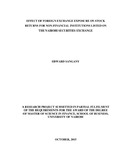| dc.description.abstract | Domestic currency depreciation makes local firms more competitive, leading to an
increase in their exports. This in turn raises their stock prices. Forex rate serves as the
basic link between the local and the overseas market for various goods, services and
financial assets. It provides a basis of matching prices of goods, services, and assets
quoted in different currencies. Forex rate movements can affect actual inflation as well as
expectations about future price movements. A country‟s external sector of foreign trade is
overly affected by foreign exchange rate movements. The study took a correlational
approach in seeking to find if indeed foreign exchange exposure is one of the factors that
affect the stock market returns and hence the foreign exchange exposure. The population
in this study consisted of all 43 non-financial institutions listed on NSE. The study
regressed stock returns against exchange rate exposure. The correlation coefficient
showed a positive relationship between the study variables. From the ANOVA statistics,
the F calculated at 5% level of significance was 5.872 and since F calculated is greater
than the F critical (Value = 2.262), this shows that both models were significant. This is
a sign that, foreign exchange exposure affects stock returns. | en_US |

